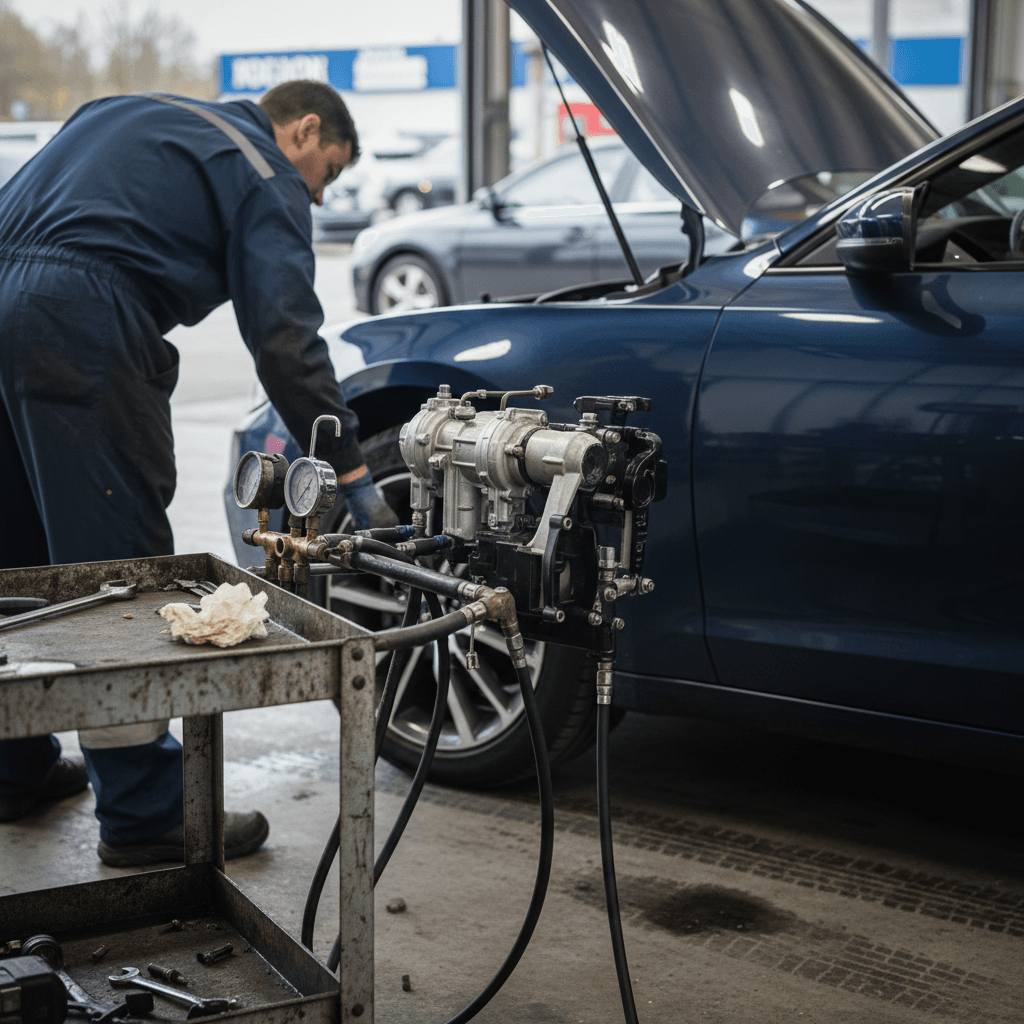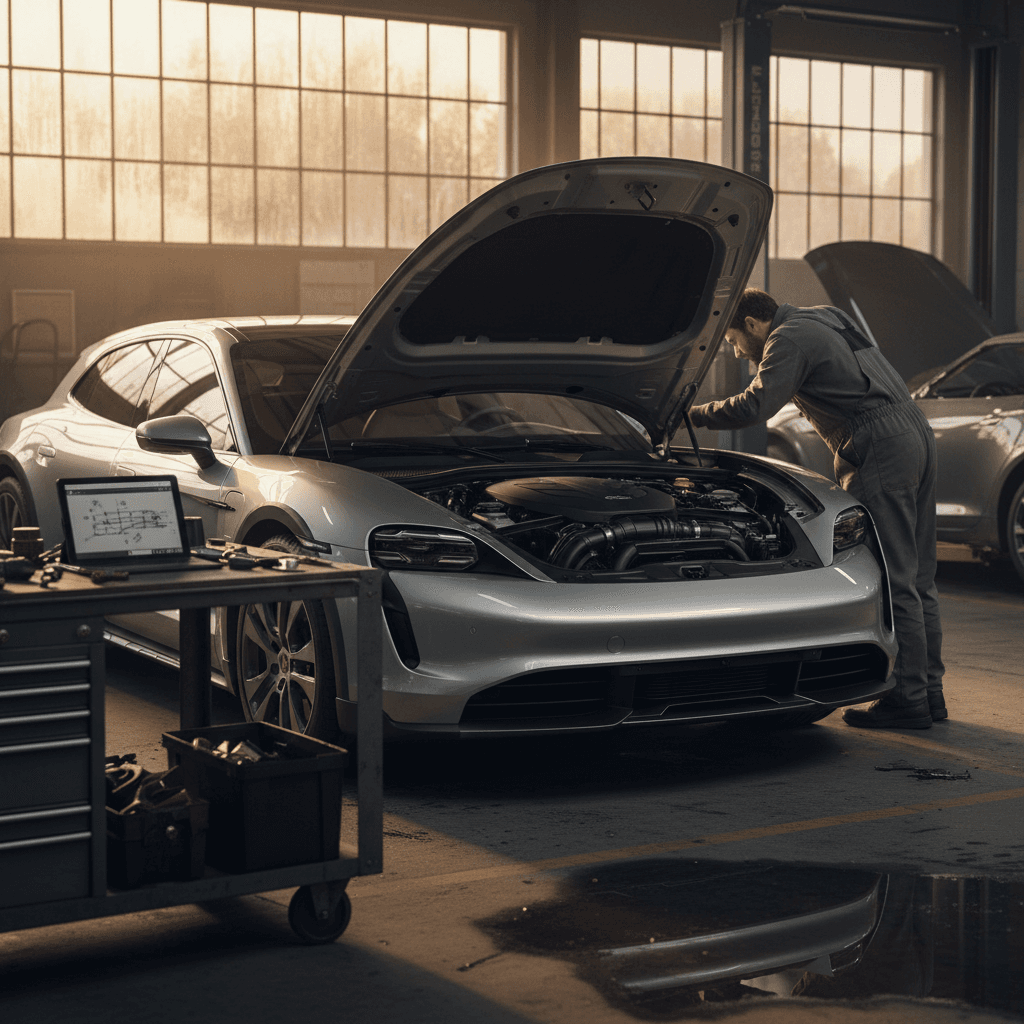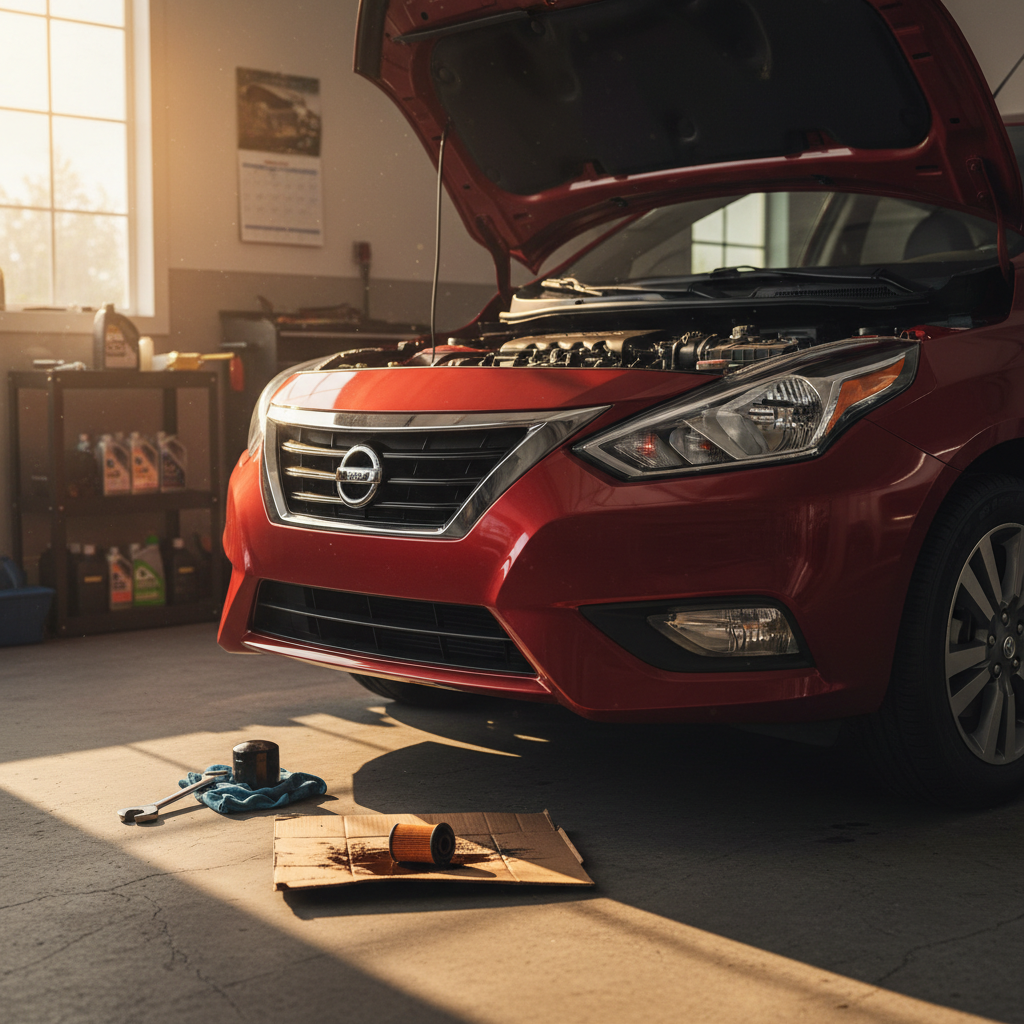You typed “electric car mechanic near me” because something doesn’t feel quite right, maybe it’s a warning light, a strange tire wear pattern, or just that first service coming due. The rules changed when you went electric, and the old game of “any corner shop will do” doesn’t quite apply. The good news: with a little know‑how, you can find the right EV mechanic nearby and avoid paying for guesswork on a high‑voltage car.
EVs are a tiny slice of cars, but a big shift for shops
Why “electric car mechanic near me” matters more in 2025
How fast EV service is changing
EVs generally need less routine maintenance than gas cars, no oil changes, no spark plugs, no timing belts. But when something goes wrong (or even just feels off), the stakes are higher. High‑voltage systems, complex software, and expensive battery packs mean you don’t want the “we’ve never seen one of these before” shrug from the service writer.
Not every shop is ready for your EV
What an electric car mechanic actually works on
When you picture an “electric car mechanic,” you might imagine someone in a space suit hovering over an open battery pack. In reality, most of what a qualified EV shop does today falls into a few buckets, some familiar from gas cars, some entirely new.
Core jobs an EV mechanic handles
1. High‑voltage & battery systems
Specialized EV mechanics are trained and certified to work around high‑voltage systems safely.
- Diagnosing battery health issues and cell imbalance
- Repairing or replacing high‑voltage contactors and cables
- Cooling system leaks around the battery pack
- In rare cases, battery module or pack replacement
2. Chassis & wear items
Most of your EV’s maintenance still lives here, especially as mileage climbs.
- Tires (EVs are heavier and eat through rubber faster)
- Brakes and brake fluid (regen doesn’t eliminate maintenance)
- Suspension and alignment (heavy battery + instant torque)
- Steering, wheel bearings, bushings
3. Software, electronics & charging
Modern EVs are rolling computers, and your mechanic needs to be bilingual in hardware and software.
- Diagnosing warning lights and fault codes
- Updating control modules when allowed by the manufacturer
- Sorting out charge‑port and onboard charger issues
- Solving quirky infotainment and connectivity glitches
Look for EV‑specific certifications
Dealer, independent, or mobile? EV service options compared
Franchise dealer service departments
For the first few years of ownership, especially while your EV is under warranty, the dealer is often your default electric car mechanic near you, whether that’s Tesla, Ford, Hyundai, GM, or another brand.
- Best for: Warranty repairs, recalls, software updates, complex high‑voltage issues.
- Pros: Direct factory support, proprietary scan tools, access to technical bulletins.
- Cons: Higher hourly rates, longer wait times, sometimes a hard sell on extras you don’t need.
Independent & mobile EV specialists
As the EV fleet grows, more independent shops and mobile technicians now focus on electric vehicles.
- Best for: Tires, brakes, suspension, general diagnosis, out‑of‑warranty repairs.
- Pros: Often faster appointments, more transparent communication, competitive pricing.
- Cons: Not all have full access to factory software; depth of EV experience can vary a lot.
Mobile EV service is growing quickly, roughly one in five EV owners has tried at‑home service. If your issue is simple, a driveway visit can beat a day in the waiting room.
A blended strategy works best

How to find a qualified EV mechanic near you
You don’t need to be an engineer to pick a good EV shop. You just need to know what to look for, and what to avoid, when you search for an electric car mechanic near me and start making calls.
A step‑by‑step way to find the right shop
1. Start with your brand’s locator
Most manufacturers list approved EV service centers on their websites. That’s your first stop for in‑warranty cars or complex issues. Tesla, for example, routes everything through its app rather than third‑party shops.
2. Search smart, not just close
On Google Maps or Apple Maps, try terms like “EV repair,” “electric vehicle service,” or “hybrid and EV specialist.” Read the actual reviews, look for mentions of your model and words like “battery,” “charger,” or “software.”
3. Scan their website for EV signals
A serious EV shop will usually show high‑voltage warning signs in photos, mention EV brands they work on, or highlight special tools and technician training. If their homepage still screams carburetors, keep looking.
4. Confirm training and certifications
Ask directly about ASE certifications, especially ASE L3 for hybrid/electric vehicles, and any brand‑specific EV training. A shop that takes EVs seriously will have a clear answer, not a shrug.
5. Ask what EV work they turn away
A confident mechanic will tell you where their limits are, maybe they don’t open battery packs, or they avoid certain brands. That honesty is a green flag, not a red one.
6. Do a low‑risk test visit
Before you need a big repair, book a smaller job, tire rotation, brake fluid, or a pre‑road‑trip check. You’ll learn a lot about their communication, timelines, and EV knowledge when the pressure’s low.
Search beyond your ZIP code
Key questions to ask before you book a visit
Once you’ve narrowed it down to one or two shops, a quick phone call can tell you whether they’re truly ready for your EV, or just hoping to learn on your car.
- “How many electric vehicles do you service in a typical month? Which brands?”
- “Are your technicians trained or certified specifically for EVs or hybrids?”
- “What EV jobs do you handle in‑house, and what do you refer to the dealer?”
- “Do you have the proper safety gear and procedures for high‑voltage work?”
- “Can you share a rough estimate range for diagnosis and common repairs on my model?”
- “How long are you typically booked out for EV appointments?”
Listen for confident, plain‑English answers
EV service costs: what’s normal, what’s not
Compared with gas cars, EVs tend to cost less to maintain but more to repair when something big breaks. Knowing the typical ranges can keep you from panicking, or overpaying, when the estimate lands in your inbox.
Typical EV service and repair cost ranges (out of warranty)
These are ballpark ranges in U.S. dollars for common services at independent shops. Dealer pricing may run higher, and costs vary by region and model.
| Service | What it includes | Typical range |
|---|---|---|
| Tire rotation & inspection | Rotate tires, check wear, set pressures, inspect brakes | $40 – $80 |
| New EV‑rated tires (set of 4) | Mounting, balancing, disposal; EV‑specific tires for weight and torque | $800 – $1,400 |
| Brake service | Cleaning slides, replacing pads/rotors as needed, fluid check | $250 – $800 |
| Coolant service (battery/drive unit) | Drain/fill EV‑specific coolant, bleed system, inspect hoses | $200 – $450 |
| 12‑volt battery replacement | Replace and program low‑voltage battery that runs electronics | $200 – $450 |
| Onboard charger or charge‑port repair | Diagnostics plus parts and labor for faulty charging hardware | $600 – $2,000+ depending on part |
| High‑voltage battery module or pack | Rare but expensive; often through dealer or specialist only | $5,000 – $20,000+ depending on brand and capacity |
Always ask for an itemized estimate for your specific vehicle before authorizing work.
Red flags on an estimate
Common EV repairs and when to worry
Most EVs on the road today are still in their first decade of life, so we’re just starting to see patterns. Here’s what typically sends owners looking for an electric car mechanic nearby, and how urgent each issue really is.
Frequent EV repair and maintenance jobs
Fast‑wearing tires
EVs are heavier and deliver instant torque, which scrubs tires faster, especially on performance models.
- Signs: Feathered edges, inside shoulder wear, noisy or choppy ride.
- Fix: Quality EV‑rated tires and a proper alignment from a shop that understands your car’s weight and torque.
- Urgency: Medium. Don’t ignore, but you usually have time to shop around.
Brake system issues
Regenerative braking means pads can last a long time, but hardware still ages.
- Signs: Grinding, pulling to one side, soft pedal, or a brake warning.
- Fix: Cleaning and lubricating hardware, replacing pads/rotors, flushing old fluid.
- Urgency: High. Brakes are safety‑critical, deal with them promptly.
Charging & charge‑port problems
These are among the most frustrating issues because they strand you at exactly the wrong moment.
- Signs: Won’t start charging, intermittent charging, port won’t lock/unlock, error codes at stations.
- Fix: Software updates, connector or latch repairs, onboard charger replacement in some cases.
- Urgency: High if it’s your primary way to charge at home.
Battery cooling and thermal faults
Your EV’s battery and drive units live and die by temperature.
- Signs: Power reduced warnings, rapid loss of fast‑charge speed, coolant level drops, or visible leaks.
- Fix: Diagnosing leaks, replacing pumps or valves, flushing coolant, occasionally deeper repairs.
- Urgency: High. Don’t ignore thermal faults, they protect very expensive parts.
Catch little problems early
If you own (or are buying) a used EV
Used EVs are where value shoppers meet the realities of battery health and repair history. A good electric car mechanic near you isn’t just a fixer, they’re also your inspector and translator before you buy and as the car ages.
Before you buy: pre‑purchase EV inspection
If you’re shopping used, especially from a private seller, budget time and money for a pre‑purchase inspection with an EV‑savvy mechanic.
- Scan for stored fault codes, even if no lights are on.
- Check battery and thermal system data where accessible.
- Inspect tires, brakes, and suspension for EV‑specific wear.
- Verify that charging works on Level 1, Level 2, and, if applicable, DC fast charging.
Some shops and platforms, like Recharged, provide detailed battery health diagnostics and transparent condition reports so you’re not guessing about the most expensive component on the car.
After you buy: set up a maintenance plan
Once you bring a used EV home, build a simple plan with your chosen mechanic.
- Baseline inspection and fluid checks (including thermal systems).
- Tire and alignment schedule tailored to your commute.
- Brake inspections, especially in salty or wet climates.
- Battery health check every year or two, or before long road‑trip seasons.
If you bought your EV through a digital retailer like Recharged, lean on their EV‑specialist support to understand the report and prioritize what to tackle first.
Recharged can help before you ever need a mechanic

Big myths about EV service, busted
- “Any mechanic can work on an EV.” – Not quite. Many shops are just starting to see EVs and may lack the tools, training, or safety gear for high‑voltage work. Basic tire and brake jobs are one thing; battery and charging issues are another.
- “EVs don’t need maintenance.” – They need different maintenance. You’ll skip oil changes, but tires, brakes, coolant, and software updates still matter, and can get expensive if ignored.
- “If the battery goes, the car is junk.” – Full pack replacements are rare and costly, but partial repairs, module replacements, and warranty coverage are improving. An experienced EV mechanic can help you sort scare stories from reality.
- “You must go to the dealer for everything.” – For warranty work and some software tasks, yes. But an independent EV‑savvy shop can handle a surprising amount of maintenance and repair once the car is out of warranty.
- “EV repairs always take forever.” – Parts supply and training can slow some jobs, especially at busy dealers. Independent specialists and mobile techs often turn routine work around much faster.
Accident or flood damage is a special case
FAQ: Electric car mechanics and service
Frequently asked questions about EV mechanics
The bottom line on finding the right electric car mechanic
Electric cars have changed what it means to “go to the shop.” You’re driving a heavy, high‑voltage, software‑rich machine that can rack up a lot of miles with very little drama, as long as the people caring for it know what they’re doing. When you search for an electric car mechanic near me, you’re not just looking for the closest option. You’re choosing a partner who can keep your EV safe, efficient, and enjoyable for years.
Start with smart research, ask direct questions, and test a shop on small jobs before you trust them with big ones. If you’re still shopping for a used EV, consider working with a specialized retailer like Recharged that provides battery‑health diagnostics, transparent pricing, and EV‑specialist support. That way, by the time you roll into your chosen mechanic’s bay, you already know your car’s story, and you can focus on the road ahead instead of worrying about what’s happening under the floor.

